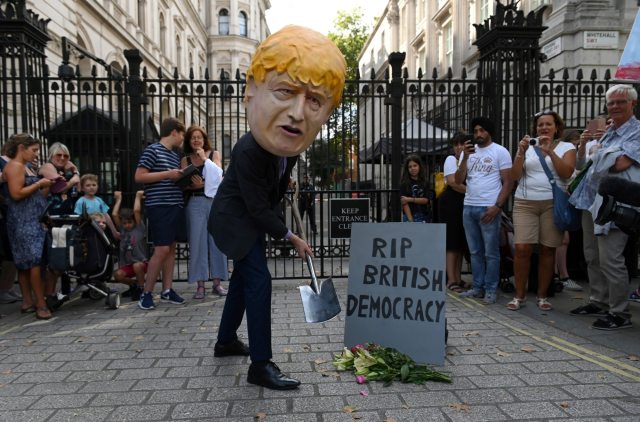Proroguing protests. Credit: Daniel Leal-Olivas/Getty

The dim roar of affront and panic emanating from Westminster yesterday, in the hours after the Government’s surprise rearrangement of the parliamentary calendar, was expressed in much of the media as “outrage” at this constitutional “coup”. In reality, it was more akin to an existential yelp, as, after years of talking and procrastination, the Brexit saga moved decisively into the ‘action’ phase.
The reaction was a reminder of just how much of a difference the disposition and life-philosophy of political leaders makes. Three years of Theresa May’s fearful, procedural style of government had smothered politics in a deathly, but comforting, torpor – Brexit had become a never-ending story, in which politicians would always be discussing options and deadlines would always be extended. There’s something rather nice about stalemate: a political version of Freud’s “death instinct”, where everyone gets to hide from the horror of actual, you know, events.
Yesterday’s announcement marked the end of that whole paradigm. The new occupants of No 10 are animated by the opposite instinct, in ways that many find deeply unsettling. Here, suddenly, is a government which delights in using the levers of power it has available and bringing events to a head.
The prorogation is not a coup. It has been designed with just enough points of justification to fall narrowly short of a constitutional outrage (it allows for the conventional September recess for party conferences, the new Queen’s Speech, and time for debate both at the start and end of the period before 31 October) but it is, without doubt, a brazen use of executive power to set the timetable for political advantage.
Its main effect will be to bring the action forward, so that the Remainer coalition in parliament will have to make its counter-move immediately and boldly when parliament resumes. To procrastinate is to lose. It’s the opposite of what we have been used to in the never-ending story of Brexit.
Looming large over this pivot to action is the figure of Dominic Cummings, the PM’s de facto chief of staff and architect of the Brexit campaign. To Brexiteers, Cummings is a hero; to Remainers, he’s a villain. To almost everyone he is intriguing and alarming in equal measure. Anyone who watched his extraordinarily rude testimony to the Commons Select Committee over the referendum campaign, or observed his lofty refusal to return when invited back, would realise that he’s an unusual character. He doesn’t seem to feel fear; he is devoid of deference to authority; and he is obsessed with theory and radical thinking.
Such strength of conviction can be attractive. Certainly, his team in No 10 seems to like his vision and clarity of purpose. But while the characteristic of being existentially unafraid of action may be found in a disproportionate number of history’s heroes and villains, it’s also at odds with the genteel traditions of British democracy. He’s not chummy or collegiate; he’s contemptuous of precedent, and in a country without a formal constitution that feels scary.
His well-documented obsession with game theory and process also has the effect of flattening the whole of politics into tactical warfare. When the warring parties are different arms of the British state – the executive versus the legislature – it feels especially uncomfortable. Of course, there are always tactics and ‘pathways to victory’ in politics, but the main pathway is usually to win the argument on its merits.
Now, the decisive phase of the Brexit story will take place with an almost exclusive focus on process and little attention to the underlying arguments. It completes the professionalisation of our politics, the conversion of voters into speculators and tacticians, co-conspirators in a procedural game. YouGov has already polled voters on their approval of prorogation as a strategic device – an odd thing for voters to have to think about.
The combination of Cummings with his boss, Boris Johnson, only heightens the sense of unease. Where Boris famously sees both sides of an argument (remember those newspaper columns he drafted for and against Brexit?), Cummings sees things perhaps deceptively clearly. Where Cummings is hard-edged and uninterested in being liked, Boris is eager to please. The combination fuels fantasies of Cummings as an evil Rasputin figure, whispering instructions into his genial master’s ear.
Boris’s own personality is famously hard to pin down; he’s changeable and weirdly detached from the consequences of his actions. Where Theresa May used to appear at world summits visibly strained to breaking point, Boris seems to find them… fun. There is a disconnect between the gravity of all these events and the cheerful blond who pops up on news clips to say how everything is going swimmingly (sometimes literally). No death-instinct on view here: the Prime Minister continues to visibly enjoy himself.
Inside No 10 they have it all mapped out: what happens if there’s a vote of no confidence next week, what happens if Parliament legislates to thwart their timetable, when an election is most likely to be. It remains to be seen whether the odd couple at the centre of power will be credited with executing a perfect masterplan or whether it will all go spectacularly wrong for them in ways they haven’t foreseen. But what’s clear is that in the ‘OODA loop’, the ‘Observe-Orient-Decide-Act’ theory of combat strategy that Cummings is known to favour, we are now firmly in the Action phase. Welcome to the endgame.










Join the discussion
Join like minded readers that support our journalism by becoming a paid subscriber
To join the discussion in the comments, become a paid subscriber.
Join like minded readers that support our journalism, read unlimited articles and enjoy other subscriber-only benefits.
Subscribe